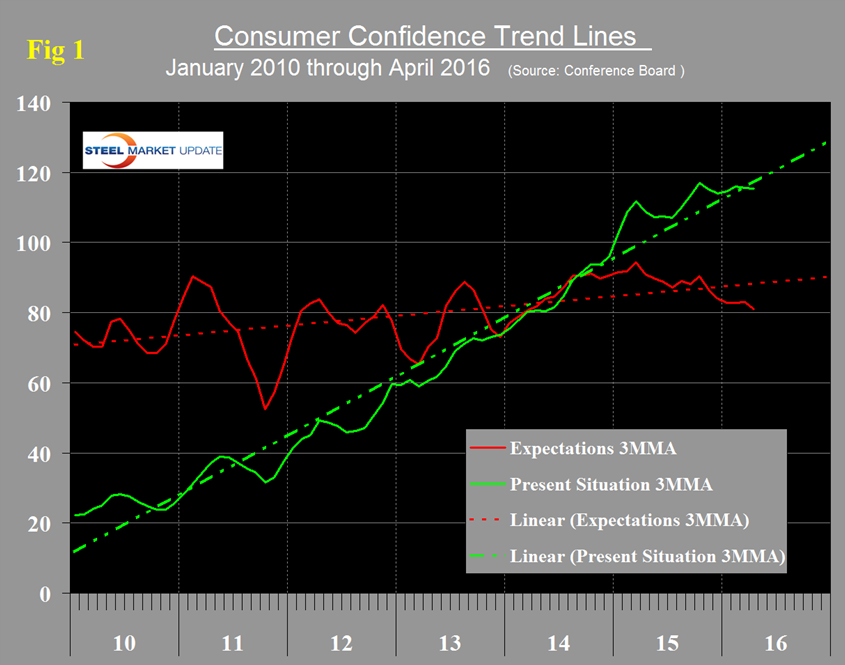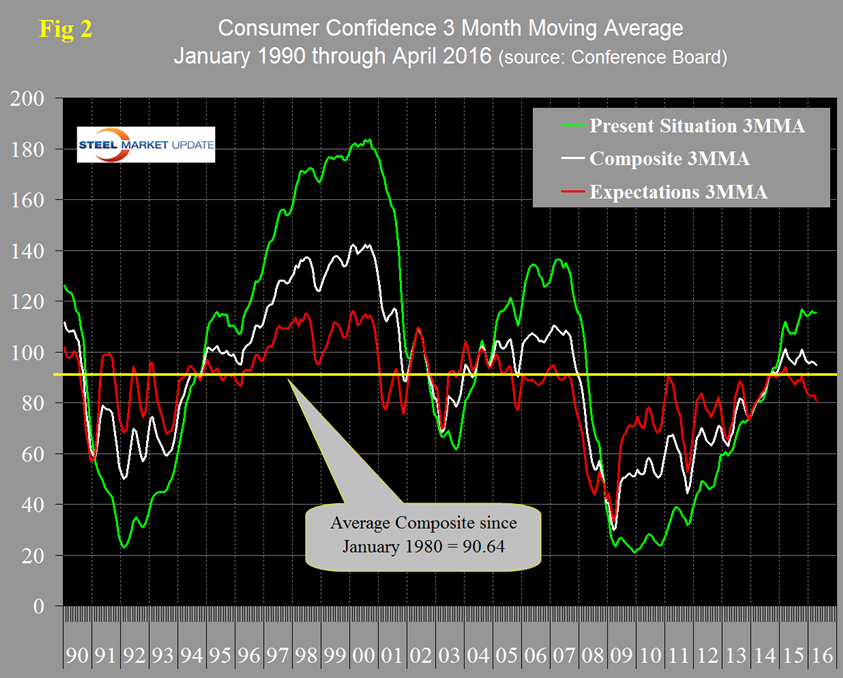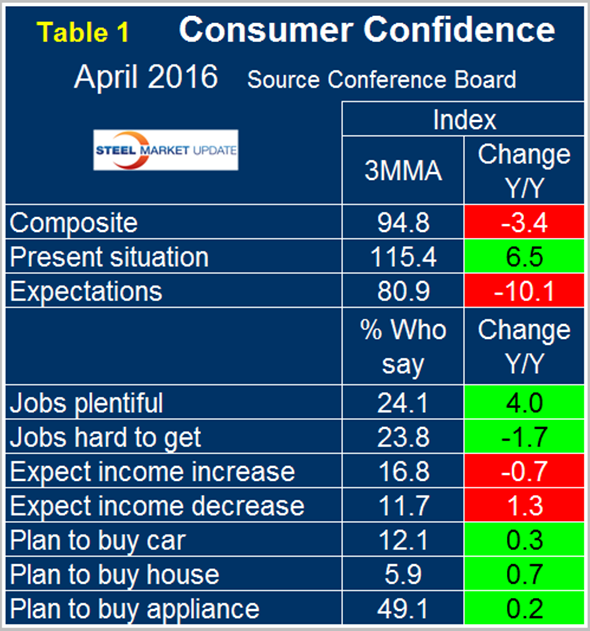Market Data

May 8, 2016
Consumer Confidence Declined in April
Written by Peter Wright
Sources for the following article are the Conference Board and SMU analysis. Please see the end of this piece for an explanation of the indicator.
Consumer Confidence declined from 96.1 in March to 94.2 in April. Included below is the official news release from the Conference Board. The three month moving average (3MMA) declined from 95.97 in March to 94.77 in April. We prefer to smooth the data in this way because of monthly volatility which in the case of Consumer Confidence has been quite extreme since the beginning of last year. The 3MMA of the present situation is now slightly below its six year trend and that of expectations has been below its six year trend for the last seven months (Figure 1).
The historical pattern of the 3MMA of the composite, the view of the present situation and expectations are shown in Figure 2.
The progression of the 3MMA of the composite was positive throughout 2014 but has been trending down since October last year. Since January last year the improvement in the present situation has been countered by the deterioration in consumer expectations. Comparing April 2016 with April 2015, (y / y) the composite was down by 3.4, the present situation was up by 6.5 and expectations were down by 10.1 (Table 1).
Comparing Table 1 with the version that we published last month the availability of jobs improved but wage expectations deteriorated for the fourth straight month. The year over year trend for auto purchase intentions was positive for the first time since July last year. Plans to buy a house have been positive for eleven straight months and plans to buy an appliance remained positive for the fourth straight month.
The official news release from the Conference Board reads as follows and is entirely based on monthly changes. This is a highly regarded indicator which we believe needs to be examined in a longer time context to get the real picture.
The Conference Board Consumer Confidence Index Declined in April
The Conference Board Consumer Confidence Index, which had increased in March, declined moderately in April. The Index now stands at 94.2 (1985=100), down from 96.1 in March. The Present Situation Index increased from 114.9 to 116.4, while the Expectations Index decreased from 83.6 to 79.3 in April.
“Consumer confidence continued on its sideways path, posting a slight decline in April, following a modest gain in March,” said Lynn Franco, Director of Economic Indicators at The Conference Board. “Consumers’ assessment of current conditions improved, suggesting no slowing in economic growth. However, their expectations regarding the short-term have moderated, suggesting they do not foresee any pickup in momentum.”
Consumers’ appraisal of current conditions improved somewhat in April. Those saying business conditions are “good” decreased from 24.9 percent to 23.2 percent. However, those saying business conditions are “bad” also declined, from 19.2 percent to 18.1 percent. Consumers’ appraisal of the labor market was also mixed. Those claiming jobs are “plentiful” decreased from 25.4 percent to 24.1 percent, however those claiming jobs are “hard to get” also declined from 25.2 percent to 22.7 percent.
Consumers were less optimistic about the short-term outlook in April than last month. The percentage of consumers expecting business conditions to improve over the next six months decreased from 14.7 percent to 13.4 percent, while those expecting business conditions to worsen rose to 11.0 percent from 9.5 percent.
Consumers’ outlook for the labor market was also less favorable. Those anticipating more jobs in the months ahead decreased slightly from 13.0 percent to 12.2 percent, while those anticipating fewer jobs edged up from 16.3 percent to 17.2 percent. The proportion of consumers expecting their incomes to increase declined from 16.9 percent to 15.9 percent; however, the proportion expecting a reduction in income also declined, from 12.3 percent to 11.2 percent.
About The Conference Board
The Conference Board is a global, independent business membership and research association working in the public interest. Our mission is unique: To provide the world’s leading organizations with the practical knowledge they need to improve their performance and better serve society. The monthly Consumer Confidence Survey®, based on a probability-design random sample, is conducted for The Conference Board by Nielsen, a leading global provider of information and analytics around what consumers buy and watch. The index is based on 1985 = 100. The composite value of consumer confidence combines the view of the present situation and of expectations for the next six months. The Conference Board is a non-advocacy, not-for-profit entity holding 501 (c) (3) tax-exempt status in the United States. www.conference-board.org.










